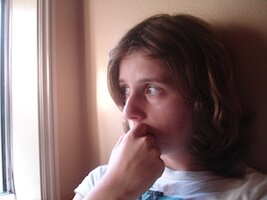One of the most common things people with BPD have in common is abandonment/attachment issues. Mine run incredibly deep & I feel that I need to warn people about in advance so they can give emotional consent about whether or not they want to invest in a relationship with me. I feel the need to warn them that I’m incredibly sensitive, have a lot of unexplainable triggers that result in dissociation (a whole other article!), and that I have problems trusting that people aren’t going to randomly disappear. And while I own these feelings, actively work on them & and try my hardest not to bring them into my relationships (often going as far as to isolate myself for periods of time when I’m feeling them), they still come up. They still permeate every single aspect of my life. With such BIG emotions, I have to ask for a whole lot of patience & understanding in all types of relationships. People who are diagnosed with BPD often have the tendency to either dive in way too deep or constantly prevent themselves from dipping their toes in the water at all, all due to fears of abandonment. Some of us are trying our hardest every second of the day to figure out some sort of healthy balance for our interpersonal relationships to the point where it gets super confusing. Many of us are very, very tired a lot of the time because of this. Sometimes, I sit around and think about how fucking un-cute that must sound to all of my potential dates and I feel really fucking defeated & lonely.
Author Archive
Naming Names – Putting Agoraphobia Into Words

I still don’t know how to talk about agoraphobia. I’ve been trying to figure out how to explain it to people since I was 16 years old, but I’ve been largely unsuccessful at putting it into words. I’ve mostly just stayed quiet about it and used vague “anxiety” euphemisms to describe why I can’t hang out / go to work / go to class / go grocery shopping / whatever, and have also spent a lot of time struggling to come up with “legitimate” ways to account for what I do with my time while NOT doing these things, especially since spending [lots of] time alone or in my “safe zones” is actually super positive for me. For almost 20 years, I’ve had no concept of how to talk about this enormous part of me that has both limited me in humongous ways and also shaped me into the wonderful weirdo that the people close to me know and love.
“Good” Victim, “Good” Self-Care

I would like to welcome the newest member of our writing team, Nikki. In her first post with us, she talks about the expectations placed on abuse victims/survivors. Thanks for sharing with us, Nikki!
There was a thing going around Tumblr that I can’t find now because I still don’t totally understand Tumblr, and it was about being a “good abuse victim.” How a “good victim” never gets involved with abusers again. “Good victims” have scars to prove their abuse, they get everything documented, they go right into therapy. They get fixed, they don’t get abused again. “Good victims” publicly call out their abusers… or wait, is it that “good victims” just talk about it with people close to them and work it out themselves and never make a scene? I don’t know, I never did it “right.” I marched around calling myself a Survivor for years which, to me, was like a “better victim,” a stronger one. Cuz when you’re a victim you’re weak and when you’re a survivor you’re strong and you did “good victim” properly and graduated. I said FUCK YOU to victimhood like it was bad. But in retrospect that’s saying there’s a right and wrong way to handle abuse, and that’s bullshit. As a repeat VICTIM of abuse I wanted to look strong even though repeat abuse makes people look weak. But fuck these hierarchies of who handles abuse the best. I am a victim of abuse and I’m surviving.

